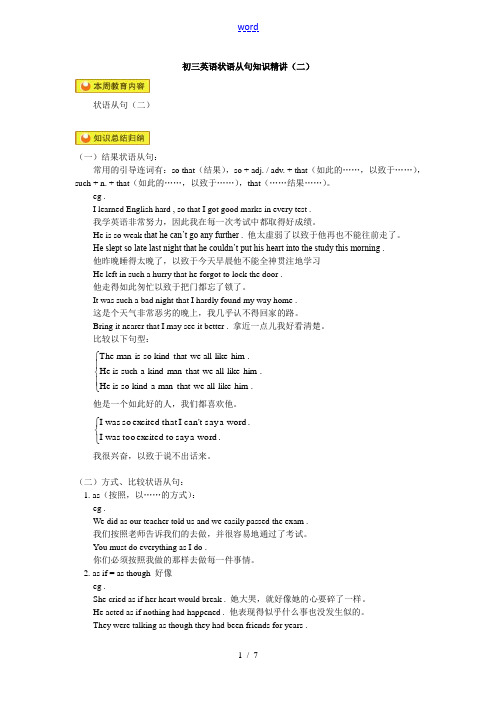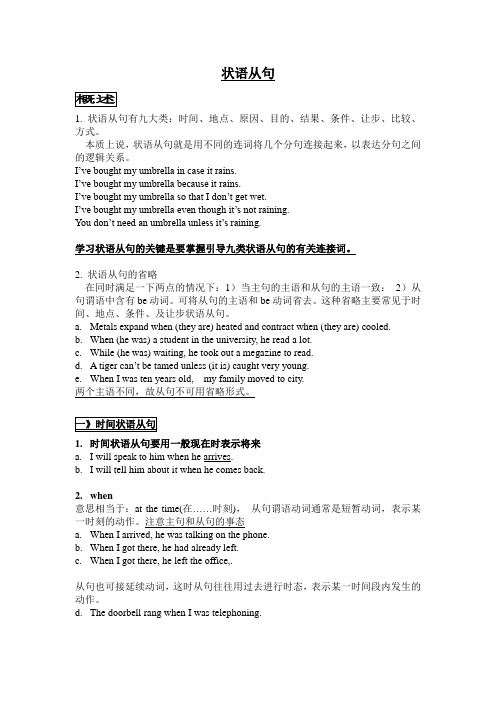状语从句2
初三英语状语从句知识精讲(二)

初三英语状语从句知识精讲(二)状语从句(二)(一)结果状语从句:常用的引导连词有:so that (结果),so + adj. / adv. + that (如此的……,以致于……),such + n. + that (如此的……,以致于……),that (……结果……)。
eg .I learned English hard , so that I got good marks in every test .我学英语非常努力,因此我在每一次考试中都取得好成绩。
He is so weak t hat he can’t go any further . 他太虚弱了以致于他再也不能往前走了。
He slept so late last night that he couldn’t put his heart into the study this morning .他昨晚睡得太晚了,以致于今天早晨他不能全神贯注地学习He left in such a hurry that he forgot to lock the door .他走得如此匆忙以致于把门都忘了锁了。
It was such a bad night that I hardly found my way home .这是个天气非常恶劣的晚上,我几乎认不得回家的路。
Bring it nearer that I may see it better . 拿近一点儿我好看清楚。
比较以下句型:⎪⎩⎪⎨⎧.him like all we that man a kind so is He .him like all we that man kind a such is He .him like all we that kind so is man The他是一个如此好的人,我们都喜欢他。
⎩⎨⎧.word a say to excited too was I .word a say t can'I that excited so was I 我很兴奋,以致于说不出话来。
状语从句2 条件状语从句

状语从句---条件状语从句(1)if 和unless 引导的条件状语从句。
if 表示正面的条件,意为“如果”;unless(=if---not )表示反面的条件,意为“除非,如果不”。
Eg. ①If you had come a few minutes earlier, you would have met him.②I may not come to see you recently unless I can complete the project ahead of time.(2)in case, on condition that, providing(that), provided(that), supposing (that), suppose(that )等词汇意思相近,意为“万一,假设,假如,在---条件下”。
①In case there is a fire, what will we do first?②Supposing/suppose(that)they refuse us, who else can we turn to for help?They agreed to lend us the car on condition that we returned it before the weekend.典例 The company promised to give us a discount we pay in advance.A.even ifB.as ifC. so thatD. provided that(3)as long as (=so long as )引导语气强烈的条件状语从句,意为“只要”。
Eg. I don't mind where you go, as long as you're back before midnight. (4)在“祈使句+and/or/or else/otherwise+陈述句”句型中,祈使句在意义上相当于条件状语从句。
地点状语从句 (2)

地点状语从句地点状语从句是由关系代词或关系副词引导的从句,用来修饰动词或介词短语,表示动作或状态发生的地点。
在英语中,地点状语从句在句子中可以充当状语的角色,增加了句子的复杂性和表达能力。
在本文中,我们将详细介绍地点状语从句的用法和特点。
1. 用关系代词引导的地点状语从句地点状语从句可以由关系代词引导,常见的关系代词有:where,wherever。
1.1 wherewhere在地点状语从句中通常指代某个地点,用来修饰动词或介词短语。
例如:•I will meet you where we first met.•He lives in a small village where everyone knows each other.•Do you know where the library is?1.2 whereverwherever在地点状语从句中注意指代任何地点,用来修饰动词或介词短语。
例如:•You can find him wherever you go.•She likes to travel and explore new places, wherever she goes.2. 用关系副词引导的地点状语从句关系副词在地点状语从句中有三个常见的引导词:where,when,why。
2.1 wherewhere在地点状语从句中的用法和关系代词一样,用来修饰动词或介词短语。
例如:•I can’t remember where I put my keys.•They went to the park, where they played games and had a picnic. 2.2 whenwhen在地点状语从句中指代某个时间点,在句子中修饰动词或介词短语。
例如:•We will go to the beach when it gets warmer.•The children can play outside when the rain stops.2.3 whywhy在地点状语从句中指代某个原因,在句子中修饰动词或介词短语。
语法专项(语文版)中职英语基础模块二Unit5 状语从句(II)

四、方式状语从句
• 方式状语从句常用的引导词有 as if/as though,as,( just)as…,like,the way 等。 • He looks as if he knew the answer. 他看起来好像知道答案。 • She looked as though she was in pain. 她看上去好像很痛苦。 • When in Rome,do as the Romans do. 入乡随俗。 • The room was decorated just as he had imagined. 房间的装饰正如他想象的那
三、结果状语从句
• 结果状语从句通常由 so that,so…that…,such…that…等引导。 • He is a very clever boy so that we all like him. • 他是一个非常聪明的孩子以至于我们都喜欢他。 • She worked hard so that ever ything would be ready by 6 o'clock . • 她拼命干以便能到6点时把一切都准备好。 • English is so useful that I am determined to learn it well. • 英语如此有用,以至于我下决心要学好它。 • We left in such a hurr y that we forgot to lock the door. 我们走得
知识巩固与能力训练
• (一)单项填空
• ( )1.We’ll climb the mountain ____ it doesn’t rain.
• A.so that
B.if
C.unless
D.though
2状语从句

状语从句1. 状语从句有九大类:时间、地点、原因、目的、结果、条件、让步、比较、方式。
本质上说,状语从句就是用不同的连词将几个分句连接起来,以表达分句之间的逻辑关系。
I’ve bought my umbrella in case it rains.I’ve bought my umbrella because it rains.I’ve bought my umbrella so that I don’t get wet.I’ve bought my umbrella even though it’s not raining.You don’t need an umbrella unless it’s raining.学习状语从句的关键是要掌握引导九类状语从句的有关连接词。
2. 状语从句的省略在同时满足一下两点的情况下:1)当主句的主语和从句的主语一致:2)从句谓语中含有be动词。
可将从句的主语和be动词省去。
这种省略主要常见于时间、地点、条件、及让步状语从句。
a.Metals expand when (they are) heated and contract when (they are) cooled.b.When (he was) a student in the university, he read a lot.c.While (he was) waiting, he took out a megazine to read.d. A tiger can’t be tamed unless (it is) caught very young.e.When I was ten years old, my family moved to city.两个主语不同,故从句不可用省略形式。
1.时间状语从句要用一般现在时表示将来a.I will speak to him when he arrives.b.I will tell him about it when he comes back.2.when意思相当于:at the time(在……时刻),从句谓语动词通常是短暂动词,表示某一时刻的动作。
2个时间状语从句

2个时间状语从句
时间状语从句是指在句子中表示时间关系的从句,它可以用来描述动作发生的时间、顺序、频率等。
以下是两个常见的时间状语从句:
1. When引导的时间状语从句:表示“当……时”,例如:
- I will call you when I arrive at the airport.(当我到达机场时,我会给你打电话。
)
- When the sun rises, the birds start to sing.(当太阳升起时,鸟儿开始唱歌。
)
2. While引导的时间状语从句:表示“在……期间”或“与……同时”,例如:
- While I was studying, my sister was watching TV.(我在学习时,我的妹妹在看电视。
)
- While the cat is sleeping, the mice are playing.(猫睡觉时,老鼠在玩耍。
)
这些时间状语从句可以帮助我们更准确地描述动作发生的时间和顺序,使句子更加清晰明了。
状语从句 (2)
真题演练
【2013四川】7. He is so busy. He cannot afford enough time with his son____ he wants to. A.even if B.as if C.because D.before
【2012 湖南】28._____ I always felt i would pass the exam, I never thought i would get an A. A.While B.Once C.If D.Until
状语从句
之让步状语从句
翰林院教育文科组毛恒青
Although/ though (不可与but连用)
e.g.He is unhappy,though/ although he has a lot of money. 注意:though还可用作adv.,意为“可是,然而”, 置于句末 He said he would come;he didn`t,ห้องสมุดไป่ตู้though.
even though/ even if(即使)
E.g. Even though/ if it is raining, we`ll go there. Even if i were busy, i would go.
whether· · · · · · or· · · · · · (不 管· · · · · · 还是· · · · · · ) e.g.Whether you believe it or not, it is true.
疑问词+ -ever 与 no matter+疑问词 (不管· · · · · · 无论· · · · · · ) e.g. Whatever (=No matter what)you say,he won`t believe you. Whoever you are(=No matter who you are), you must obey the rules.
让步状语从句2
考点81:表示“无论, 不管”的让步状语从句的用法表示“无论,不管”的让步状语从句的引导词在含义上各有侧重,学习其用法时要分别进行把握。
1. “no matter+疑问词”或“带后缀ever的疑问词”可以表示“不管……”的含义,引导让步状语从句(前一结构所表示的语气要稍强于后一结构),例如: However (= No matter how) much I tried, I failed to work out the maths problem. 无论怎么努力,我还是解不出这道数学题。
// However (=No matter how) hard he may try, he will not attain his goal. 无论怎样努力,他都达不到他的目标。
// Whatever (=No matter what) you say, I will not change my mind. 无论你说什么,我也绝不改变主意。
// Whenever (=No matter when) you come, you will be warmly welcomed. 不论什么时候来,你都会受到热烈欢迎。
// Wherever (=No matter where) you go, you will find the same thing. 无论到哪里,你都会发现同样的事情。
// Whoever (=No matter who) you are, you have no right to do such a thing. 不管你是谁,你都无权做这种事。
2. “whether... or...”可以引导包含选择范围的让步状语从句,意为“不管……”。
例如: I shall go, whether you come with me or stay at home. 不论你来还是留在家中,我都要去。
// Whether she wins or loses, this is her last chance. 不管是赢是输,这都是她的最后一次机会。
第二条件状语从句
第二条件状语从句第二条件状语从句是英语语法中的一种从句类型,用于表达一个条件,通常是与主句相反的条件。
下面是一些关于第二条件状语从句的例子:1. If I weren't so busy, I would go to the party tonight.如果我不是那么忙,我就会去参加今晚的派对。
2. If he didn't smoke so much, he would be healthier.如果他不那么抽烟,他会更健康。
3. If the weather weren't so bad, we could go for a walk.如果天气不那么糟糕,我们可以去散步。
4. If I had more money, I would travel the world.如果我有更多的钱,我会周游世界。
5. If he spoke English fluently, he could get a better job.如果他讲英语流利,他可以获得更好的工作。
6. If I didn't have to work tomorrow, I would stay up late tonight.如果我明天不用工作,我今晚会熬夜。
7. If she wasn't so shy, she would make more friends.如果她不那么害羞,她会交更多的朋友。
8. If I had known about the traffic, I would have left earlier.如果我知道了交通堵塞的情况,我会早点离开。
9. If we didn't live so far away, we could visit each other more often.如果我们不住得那么远,我们可以更频繁地互相拜访。
10. If the restaurant weren't so crowded, we could get a table.如果餐厅不那么拥挤,我们可以找到一个桌子。
高三英语 状语从句2
while) 2.从句动作发生在主句动作之前时,只能用when引导这个
从句,不可用as或while。如: When you have
saw land. “……才” 2. We hadn’t run a mile before he felt tired.
“不到……就”
3. Please write it down before you forget it. “趁……”
4.Before I could get in a word, he had measured me.“还没来得及”
的,也可以是表短暂性动作的动词,可用于主句和从句 动作同时发生或从句动作先于主句动作。如:
When the film ended, the people went back.
When I lived there, I used to go to the seashore on
Sundays. 2. 可用作并列连词,其意义为“那时,这时”,相当于
1. (03北京春) -Was his father very strict with him when
he was at school?
-Yes. He had never praised him ___C___ he became
one of the top students in his grade.
为肯定,意为“某动作直到某时间才开始”。如:
He won’t go to bed till/until she returns. 3.till不可以置于句首,而until可以。如:
- 1、下载文档前请自行甄别文档内容的完整性,平台不提供额外的编辑、内容补充、找答案等附加服务。
- 2、"仅部分预览"的文档,不可在线预览部分如存在完整性等问题,可反馈申请退款(可完整预览的文档不适用该条件!)。
- 3、如文档侵犯您的权益,请联系客服反馈,我们会尽快为您处理(人工客服工作时间:9:00-18:30)。
状语从句状语从句(一)1、时间状语从句when, while, before/after, as soon as, (not)…until/till, since1)区分 when 与 whilewhen引导的从句的谓语动词可以是延续性的动词,又可以是瞬时动词。
Eg: When she came in, I stopped eating.她进来时,我停止吃饭。
(came为瞬时动词)While引导的从句的谓语动作必须是延续性的,此延续性动词常用进行时态。
e.g: ①While my wife was reading the newspaper, I was watching TV.我妻子读报时,我在看电视。
(was reading是延续性的动词,was reading和was watching同时进行)② While we were having a meeting, Mr. Black came in.正当我们开会时,布莱克先生进来了。
(were having a meeting 是延续性动词, 该动作正在进行时,另一个动作发生)2)学会使用before 与 afterbefore 表示 “在…之前”;after 表示 “在…之后”e.g: My father had left for Canada just before the letter arrived.我父亲恰好在信到之前去加拿大了。
e.g: After we finished the work, we went home.完成工作之后,我们回家了。
3)掌握 as soon as一…就…这个词组常出现在完成句子中,考试的几率比较多。
e.g: ①I will go there as soon asI finish my breakfast.吃完早饭,我立即到那里去。
②As soon as I reach Canada, I will ring you up.我一到加拿大,就给你来电话。
(注意:此句型常考时态:主句用将来时,从句用一般现在时。
)4)理解并掌握until 直到…E.g: I worked until he came back.我工作到他回来为止如果主句中的谓语动词是瞬时动词时,必须用否定形式。
e.g: I didn’t fall asleep until mother came back last night. 昨晚直到妈妈回家我才入睡。
(要注意翻译:not…until 直到…才)如果主句中的谓语动词是延续性动词时,用肯定或否定形式都可以,但表达的意思不同。
I worked until he came back.我工作到他回来为止。
I didn't work until he came back.他回来我这才开始工作。
I didn't go to bed until my father came back.直到我父亲回来我才上床睡觉。
对应练习:选择填空① Mother _______ when father was reading newspapers.A. is cookingB. was cookingC. cooks② I ________ to bed until I finished writing the composition.A. didn’t goB. wentC. did go③ I was doing the housework _______ my mother was having a rest.A. as soon asB. beforeC. while④ I will call you as soon as he _______ here.A. will comeB. comesC. come⑤ I must go to the shop _______it closes.A. whenB. afterC. before时间状语从句里,通常不用将来时态,而用现在时表将来(主将从现)例如:I’ll call you as soon as I get to New York. / I will tell him the truth when he comes.2、原因状语从句: because,for,as 选项中没有because时,用for或as because引导的原因状语从句一般放于主句之后,because表示直接原因,语气最强,最适合回答 why引导的疑问句。
例如: I do it because I like it. 我做这件事是因为我喜欢。
(1)原因状语从句通常由because, since, as引导。
例如:He didn’t come to school because he was ill.As it is raining, we shall not go the zoo.Since you can’t answer the question, I’ll ask someone else.(2)because表示直接原因,语气最强。
Because引导的原因状语从句多放在主句之后。
回答由why提出的问题,只能用because。
As和since语气较弱,一般用来表示明显的原因。
由as和since引导的原因状语从居多放在句首。
例如:------Why aren’t going there?------Because I don’t want to.As he has no car, he can’t get there easily.Since we have no money, we can’t buy it.(3)because和so不能同用在一个句子里。
3、目的状语从句: so that; in order that 从句中常出现情态动词can,could, would等(1)目的状语从句通常由 so that, in order that引导。
例如:We started early so that we could catch the first train.He studies hard so that he could work better in the future.We used the computer in order that we might save time.(2)so that既可引导目的状语从句,又可引导结果状语从句。
区别这两种从句的办法有两个:1)目的状语从句里往往带有情态动词can, could, may, might等。
2)从意思上看,目的状语从句往往表示的目的很明确。
例如:Speak clearly so that they may understand you. (目的状语从句)Jack is badly ill so that he has to rest. (结果状语从句)4、结果状语从句:(1)结果状语从句由so…that, such…that, so that引导。
例如:He is so poor that he can’t buy a bike for his son.She is such a good teacher that everybody likes her.My pencil fell under the desk, so that I couldn’t see it.(2)so…that语such...that可以互换。
例如:在由so...that引导的结果状语从句中,so是副词,与形容词连用。
其结构是: “...so + 形容词(副词)+ that + 从句”。
例如:He was so glad that he couldn’t say a word.The hall is so big that it can hold 2,000 people.Mother lives so far away that we hardly ever see her.在由such…that引导的结果状语从句中,such是形容词,它修饰的可以是单数或复数可数名词,也可以是不可数名词;名词前面可以带形容词,也可不带。
如果是单数可数名词,前面需加不定冠词a或an。
例如:It was such a hot day that nobody wanted to do anything.He had such long arms that he could almost touch the ceiling.He made such rapid progress that he did very well in the mid-term.有时上述两种结构是可以互换的。
例如:It was such a wonderful film that all of us wanted to see it again.=The film was so wonderful that all of us wanted to see it again.It is such an important match that nobody wants to miss it.=The match is so important that nobody wants to miss it.(3)如果名词前由many, much, little, few等词修饰时,只能用so, 不用such。
例如:Soon there were so many deer that they ate up all the wild roses.He has so little time that he can’t go to the cinema with you.5、让步状语从句(1)让步状语从句通常由although, though等连词引导。
例如:Though he is young, he knows a lot.Although I am tired, I must go on working.(2)although(though)不能用在同一个句子中。
例如:我们不能说:Though it was raining hard, but he still went out.应该说:Though it was raining hard, he still went out.或It was raining hard, but he still went out.让步状语从句 although / though although 只能用于句首注意的是不能与but连用,切记6、地点状语从句地点状语从句常常由where来引导。
